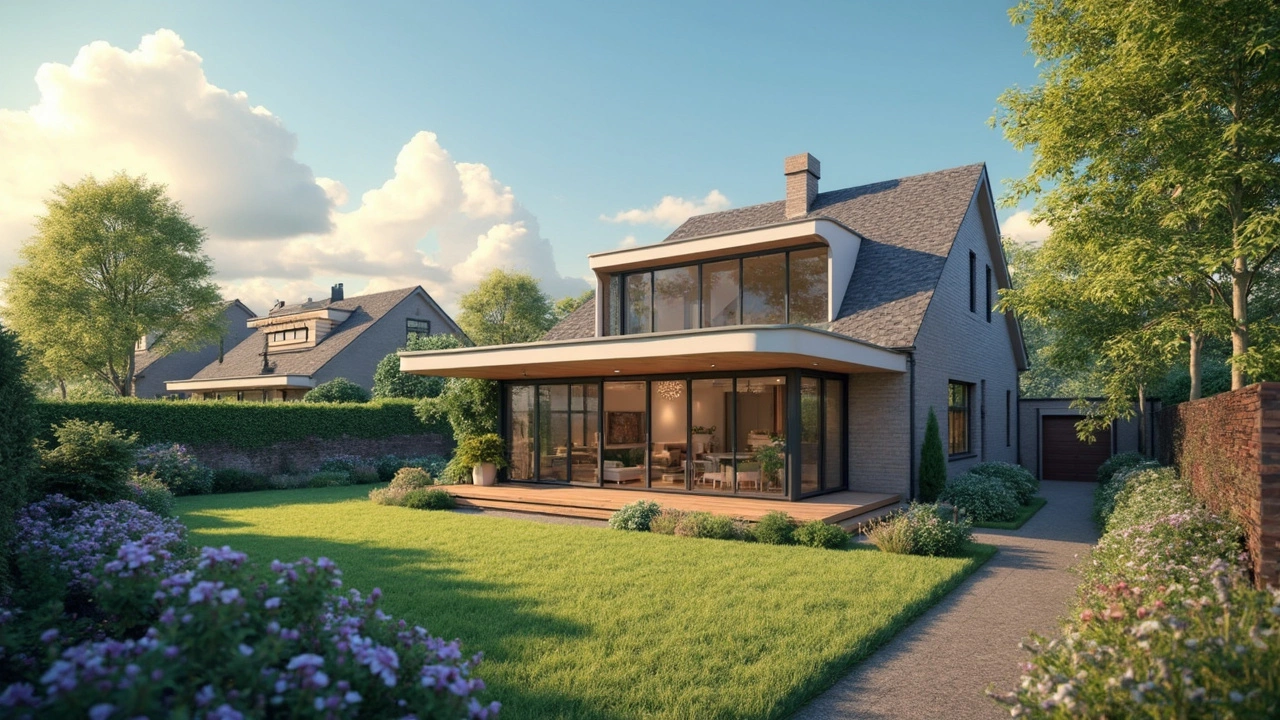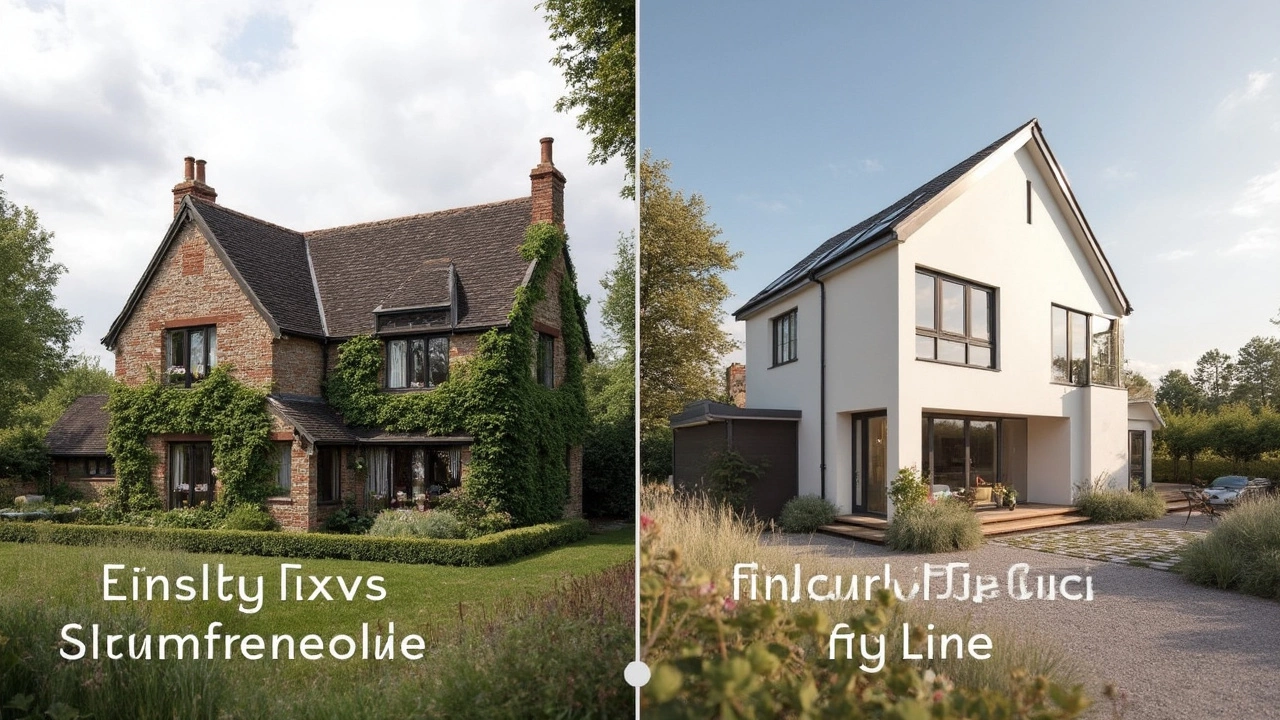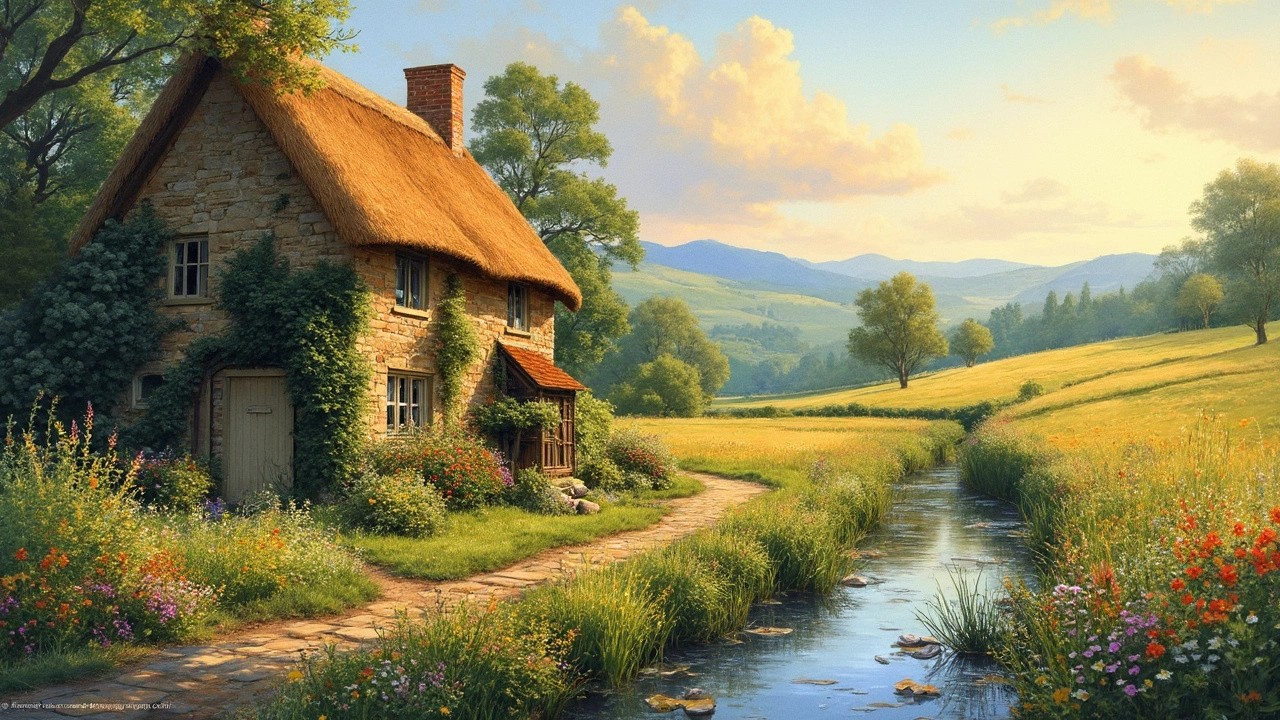Cottage vs. Small House: What's the Real Difference?
5 Apr, 2025Thinking of moving away from the city noise and into something a bit more quaint, perhaps like a cottage or a small house? It's not just about size but how each of these options can shape your lifestyle. While cottages are often nestled in picturesque locations, exuding an old-world charm, small houses aren't just mini-versions of the standard home; they're usually compact, efficient, and modern.
So, what’s the real deal between the two? A cottage often boasts rustic features, think wooden beams and maybe even a thatched roof. It whispers stories of simpler times, and its charm is almost magical. Small houses, on the other hand, are all about making the most of every inch, often incorporating clever storage solutions and a sleek, minimalistic design.
Why does this matter? Well, choosing between a cottage and a small house isn’t just about the space you’ll live in; it’s about the life you want to lead. Do you crave the coziness of a cottage, with its connection to nature and rich history, or do you lean towards the efficiency and modern flair of a small house with all the conveniences?
- What Defines a Cottage?
- Small Houses: A Modern Take
- Lifestyle Implications
- Design and Aesthetic Differences
- Making the Right Choice for You
What Defines a Cottage?
A cottage isn't just a small, cozy home; it's a lifestyle choice wrapped in charm and tradition. Imagine a place that brings to mind storybook settings—think classic features like wooden beams, stone fireplaces, and maybe even an ivy-clad facade. These aren't merely aesthetics; they conjure a sense of nostalgia and simplicity.
Historically, cottages were rural dwellings for farmers or workers. Over time, they've become coveted retreats, often set in stunning locations like lakesides or rolling hills. The allure of a cottage lies in its unique architecture and the sense of escape it offers from hectic urban life.
Most traditional cottages are characterized by:
- Layout: Usually, a cottage has a simple, one or two-story design, often without a defined floor plan. This allows for cozy, informal rooms.
- Materials: Expect a lot of natural materials like wood and stone, contributing to that rustic vibe.
- Size: Generally smaller, cottages make the most of their space by using every nook creatively.
Interestingly, cottages have seen a rise in popularity as vacation homes or even primary residences due to their quaint appearance and peaceful settings. According to recent trends, the desire to embrace this slower, more intentional way of living is growing. People are drawn to the comfort and connection with nature that cottages usually provide—something a small house might not replicate.
Small Houses: A Modern Take
Small houses, often part of the small house movement, have become a symbol of modern, efficient living. Unlike traditional homes, these are more about functionality and maximizing every square foot. What's interesting is that small houses take clever design techniques used in urban apartments and apply them to a more sustainable, open layout.
One well-known trend in small houses is the open-concept floor plan. By eliminating walls and doors wherever possible, these homes encourage flexible use of space. Think of a kitchen that flows seamlessly into a living area, creating a space that feels much larger and inviting.
Modern small houses often come packed with sustainable features too. Solar panels, rainwater collection systems, and eco-friendly materials are common. These features not only reduce the ecological footprint but can also save money on utilities in the long run.
The size might be small, but innovation shines here. For instance, tiny houses often have convertible furniture. A couch that turns into a bed, or a fold-out table that appears and disappears as needed. This is about making the space work for you in versatile ways.
Interested in the numbers? On average, a small house is around 500 to 800 square feet, which might sound tight, but many happy homeowners find these footprints to be just perfect for simpler living. Plus, regulatory hurdles are often easier with small homes due to fewer requirements compared to larger structures.
Whether it's the focus on sustainability, minimalism, or cost-effectiveness, small houses are redefining how people view 'home.' They're inviting us to consider what truly matters—spaces that feel good and function well, without the clutter.

Lifestyle Implications
So, you're pondering on whether a cottage or a small house is your ideal home. Each comes with its own set of lifestyle implications that might sway your decision.
Choosing a cottage often means embracing a slower pace of life. Cottages exude a charm that's linked with leisurely weekends, maybe even gardening, and definitely appreciating the great outdoors. They’re like the embodiment of cozy evenings by a fire and living simply without tons of tech distractions.
Living in a small house, on the other hand, often prioritizes efficiency and modern conveniences. These homes make the most out of limited space with their clever designs. If you're someone who thrives on order and minimalism, a small house might offer the lifestyle you crave.
Maintenance is another angle to consider. Cottages, being older structures usually, might need a bit more upkeep, especially if they have those charming but high-maintenance features like wooden beams or thatched roofs. Small houses generally come with modern, low-maintenance materials that could save you effort and money in the long run.
And let’s talk about community. A cottage in a rural setting might mean fewer neighbors but a close-knit community spirit. Small houses are often found in urban or suburban areas, offering connectivity and more social interaction but maybe less privacy.
Essentially, your choice boils down to how you envision day-to-day life. Is it the peace and quiet of the countryside in a cottage, or the hustle and convenience of urban locales that come with a small house?
Design and Aesthetic Differences
When it comes to the design and aesthetic of cottages versus small houses, there’s quite a distinct story each tells about living styles and choices. Cottages often have this classic look. You might see features like rustic stone walls, wooden beams across the ceiling, and maybe a charming fireplace. They’re like stepping into another era, blending perfectly with the landscape, whether that’s a rolling countryside or a seaside retreat.
The beauty of a cottage isn't just in its standalone features; it's in how they come together to create an inviting atmosphere. Think of the cozy nooks, the slightly uneven floors that hint at their age, and windowsills that seem made for flower pots. The goal with a cottage is to feel quaint yet complete.
Small houses take a different approach, sticking to modern design principles. These homes focus on maximizing functionality and space efficiency. Expect lots of built-in solutions – like modular furniture that adapts to multiple uses, sleek lines, and open floor plans that make tiny spaces feel open and airy.
There's a cleverness to small houses, using every square foot smartly. They often feature big windows to bring in natural light, which adds a sense of space and openness that people love, especially newbies to small living.
Here's a little breakdown of some key differences:
- Materials: Cottages often use natural materials like stone and wood, while small houses lean towards metal and glass for an ultra-modern look.
- Layout: Cottages have a more segmented, room-by-room layout, while small houses favor open plans that blend living spaces together.
- Features: Cook up memories in a cottage with a quaint kitchen setup, often smaller and cozier. A small house might feature a compact but state-of-the-art kitchenette.
The choice ultimately boils down to your personality and lifestyle needs. Some might find charm in old-world elegance, while others might be drawn to the sleek efficiency of new-age design.

Making the Right Choice for You
Choosing between a cottage and a small house isn't just a decision about size—it's about defining your lifestyle. Here's how to figure out what suits you best.
First, consider your location preference. Do you dream of a quiet life in the countryside? A cottage might be your thing if you love being surrounded by nature. Many cottages sit in scenic spots, offering a peaceful vibe and a break from city buzz. Meanwhile, if you need a blend of rural calm and urban convenience, a small house might strike the right balance, as they often pop up in more developed areas.
Next, think about your lifestyle needs. Do you need space for a home office or a growing family? While both options can offer extra rooms, small houses often focus on maximizing functionality. They usually come with modern amenities that make small-scale living comfortable and efficient.
Your budget will also play a big part in your decision. Cottages can have an appeal with their cozy charm, often priced lower due to location. However, renovations can be pricey if you're not careful. Small houses may seem costlier initially, but their energy efficiency could save you money in the long run.
Lastly, consider the aesthetic vibe you want. A cottage offers an old-world charm with a rich history in design—think vintage fixtures and rustic charm. Small houses often lean toward sleek, minimalistic aesthetics with smart storage solutions.
- If tranquility and charm are your top priorities, go cottage.
- If efficiency, modern aesthetics, and functionality matter more, a small house is a great pick.
Weigh your options, think about daily living, and remember that either choice should ultimately make you feel at home!

 by
by